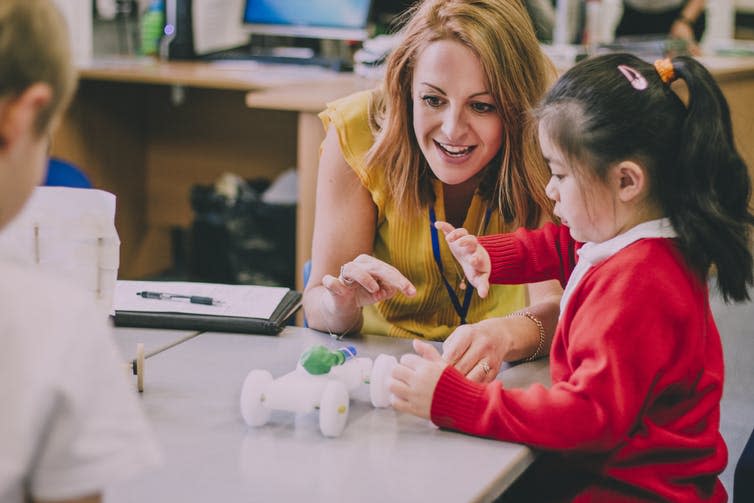The British government is failing pupils with special needs – here's how to change that

Children, parents and teachers in England recently took to the streets to march over a “national crisis” in special educational needs (SEND) funding.
The Send National Crisis campaign say special needs funding is failing to keep pace with demand and that reductions in school and college funding has led to teaching assistant support being cut. They also say that special needs provision in England has lost out on £1.2bn since 2015 as central government has failed to provide sufficient funding increases to keep pace with increased demand. Indeed, research by the national education union found that 93% of local authorities have been affected by this funding shortfall since 2015.
This seems ironic given that 2019 marks the 25th anniversary of UNESCO’s Salamanca Statement – the most influential international policy document on special education. It argues that regular schools with an inclusive orientation are the most effective means to combat discriminatory attitudes and create welcoming communities. This type of provision, it concludes, can help to build an inclusive society and achieve education for all.
Over recent years, many countries have made great strides in terms of inclusive education. The Italian government, for example, closed all special schools, units and other non-inclusive provision. The Canadian province of New Brunswick enacted legislation making disability discrimination in education unlawful. Portugal has recently introduced a legal framework for the inclusion of disabled children. Meanwhile, England has gone backwards, with more students placed in segregated provision or excluded from educational opportunities.
So what can be learnt from other countries approaches to inclusive education?
Involve families
A pattern that emerges from international research is the way education systems based on competition and choice – like in England – reduce connections between schools and their local communities. Put simply, too many families feel the need to choose schools away from their homes that seem more attractive. This is worrying in the light of research which indicates that in order to achieve greater inclusion the work of schools with families and local communities is vital.

Developing inclusive schools requires a collective effort from teachers, families and the wider community for it to fully work. And there must be a clear sense of what is intended. In particular, the term “inclusion” must be defined in a way that will speak to everybody who needs to be involved. The definition of inclusion provided by UNESCO is particularly helpful in that it avoids the use of jargon: “Every learner matters and matters equally”.
Teachers must feel valued
Evidence from the OECD suggests that countries where teachers are supported, and where the profession is valued, are able to be more effective in the classroom for all students – so teacher support is vital if inclusion is to go mainstream.
Schools also need to be reformed and practices need to be improved in ways that will lead teachers to respond positively to student diversity. This will encourage teachers to see individual differences not as problems to be fixed but as opportunities for enriching learning. This kind of approach is more likely to be successful in environments where there is a culture of collaboration that encourages collective problem solving between staff.

Tackle the bigger picture
It’s also important to know who is included, who is segregated and who is excluded from schooling. Without such data, there can be no accountability. But when data collection efforts are only focused on particular categories of pupils, as is currently the case, there is a risk of promoting negative views of those students who share certain characteristics, or come from similar backgrounds. This distracts attention from more fundamental questions, such as: why are schools failing some learners, and what are the barriers experienced by these students?
Also, given the dangers associated with school isolation and competition, it is clear that inclusion requires some form of local coordination. Unfortunately, in many parts of England no one organisation has the overall picture that would enable them to orchestrate more collaborative ways of working. This is why local authorities should be involved in monitoring and challenging schools – including academies – while teachers share responsibility for the overall leadership of improvement efforts.

What connects these ideas is the importance of drawing together teachers, parents and the community around a common purpose. Evidence from other parts of the world suggests that this has the potential to benefit all students. In this way, an emphasis on inclusion contributes to improvements in the overall quality of national educational provision.
Education is devolved in the UK – which means that each home nation can pursue its own education agenda – so it can be hard to make comparisons. But there’s no reason why it isn’t possible to have an inclusive education system across the board – what is needed is the collective will to make it happen.
This article is republished from The Conversation under a Creative Commons license. Read the original article.

Mel Ainscow does not work for, consult, own shares in or receive funding from any company or organisation that would benefit from this article, and has disclosed no relevant affiliations beyond their academic appointment.

